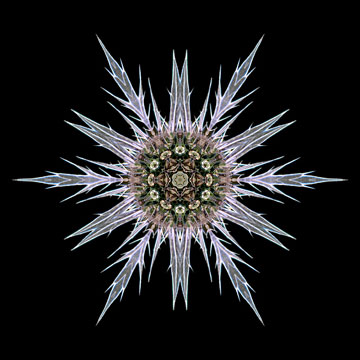ON THE ORIGIN, NAMING AND USES OF SEA HOLLY
During Atlantis’ eighth invasion,
When that island nation had exhausted
Its supply of metal, the gardeners
Left their greenhouses, went to the warriors
And said, “We’ve made you coastal defenses—
Blades six inches long, divided triply,
Coarse-toothed, spine-edged, deep-rooted. They’ll tangle
In the wrathful crab-men’s chitinous claws
Rip the bellies from the Devil’s dolphins
When they force their landings upon the beach.”
“These are wooden weapons?” asked the warriors.
“They are flowers,” came the gardeners’ reply.
“How are they named? How were they created?”
“We name them not at all, as is our style.
Nor dare we share the secret of their birth.
But our moth-prophets whisper at midnight
That Greeks shall call the flower Eryngium
After their word eruggaein meaning
To eructate and Dioscorides
Will recommend them for healthful purges.
No Roman will credit us as the plant’s
Inventor; rather they will imagine
Lusty Venus overate on love foods,
That while gorging on pine nuts, ripe peaches,
Arugala, anise and river snails
She vomited forth the mixed mass of them,
But, as no thing she touches turns ugly,
She belched cobalt flowers into the sea.
Britons will make sweetmeats from the boiled roots,
Call them ‘kissing comfits,’ feed them gladly
To lovers whose libidos they’d increase.
The Saxons shall call the plant eryngo
Or sea hulver or sea holme, this last name
Which we specially love, because ‘holme’ means
The sea, or flooded regions, or holly,
Or a deserted isle, like ours will be
After the ninth invasion (or so say
The blameless moth-prophets who never err).
Thus will the English look on the flower,
Say sadly, ‘There’s no place like holme,’ and think
On doomed Atlantis.” Then the gardeners
Took up their seedbags and sowed the beaches
With weapon-flowers to stave off the fleet
That even then was putting out to sea.
